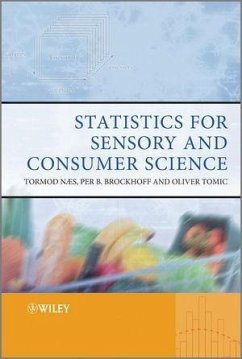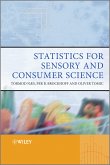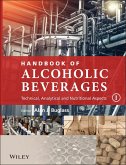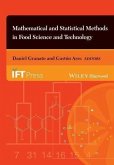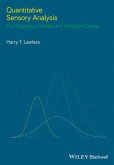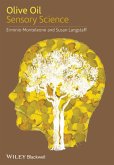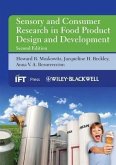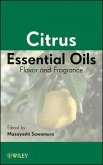

Alle Infos zum eBook verschenken

- Format: ePub
- Merkliste
- Auf die Merkliste
- Bewerten Bewerten
- Teilen
- Produkt teilen
- Produkterinnerung
- Produkterinnerung

Hier können Sie sich einloggen

Bitte loggen Sie sich zunächst in Ihr Kundenkonto ein oder registrieren Sie sich bei bücher.de, um das eBook-Abo tolino select nutzen zu können.
As we move further into the 21st Century, sensory and consumer studies continue to develop, playing an important role in food science and industry. These studies are crucial for understanding the relation between food properties on one side and human liking and buying behaviour on the other. This book by a group of established scientists gives a comprehensive, up-to-date overview of the most common statistical methods for handling data from both trained sensory panels and consumer studies of food. It presents the topic in two distinct sections: problem-orientated (Part I) and method orientated…mehr
- Geräte: eReader
- mit Kopierschutz
- eBook Hilfe
- Größe: 3.87MB
![Statistics for Sensory and Consumer Science (eBook, PDF) Statistics for Sensory and Consumer Science (eBook, PDF)]() Tormod NæsStatistics for Sensory and Consumer Science (eBook, PDF)112,99 €
Tormod NæsStatistics for Sensory and Consumer Science (eBook, PDF)112,99 €![Handbook of Alcoholic Beverages (eBook, ePUB) Handbook of Alcoholic Beverages (eBook, ePUB)]() Handbook of Alcoholic Beverages (eBook, ePUB)329,99 €
Handbook of Alcoholic Beverages (eBook, ePUB)329,99 €![Mathematical and Statistical Methods in Food Science and Technology (eBook, ePUB) Mathematical and Statistical Methods in Food Science and Technology (eBook, ePUB)]() Mathematical and Statistical Methods in Food Science and Technology (eBook, ePUB)187,99 €
Mathematical and Statistical Methods in Food Science and Technology (eBook, ePUB)187,99 €![Quantitative Sensory Analysis (eBook, ePUB) Quantitative Sensory Analysis (eBook, ePUB)]() Harry T. LawlessQuantitative Sensory Analysis (eBook, ePUB)154,99 €
Harry T. LawlessQuantitative Sensory Analysis (eBook, ePUB)154,99 €![Olive Oil Sensory Science (eBook, ePUB) Olive Oil Sensory Science (eBook, ePUB)]() Olive Oil Sensory Science (eBook, ePUB)152,99 €
Olive Oil Sensory Science (eBook, ePUB)152,99 €![Sensory and Consumer Research in Food Product Design and Development (eBook, ePUB) Sensory and Consumer Research in Food Product Design and Development (eBook, ePUB)]() Howard R. MoskowitzSensory and Consumer Research in Food Product Design and Development (eBook, ePUB)210,99 €
Howard R. MoskowitzSensory and Consumer Research in Food Product Design and Development (eBook, ePUB)210,99 €![Citrus Essential Oils (eBook, ePUB) Citrus Essential Oils (eBook, ePUB)]() Citrus Essential Oils (eBook, ePUB)122,99 €
Citrus Essential Oils (eBook, ePUB)122,99 €-
-
-
Dieser Download kann aus rechtlichen Gründen nur mit Rechnungsadresse in A, B, BG, CY, CZ, D, DK, EW, E, FIN, F, GR, HR, H, IRL, I, LT, L, LR, M, NL, PL, P, R, S, SLO, SK ausgeliefert werden.
- Produktdetails
- Verlag: John Wiley & Sons
- Seitenzahl: 294
- Erscheinungstermin: 20. Juni 2011
- Englisch
- ISBN-13: 9781119957249
- Artikelnr.: 37360512
- Verlag: John Wiley & Sons
- Seitenzahl: 294
- Erscheinungstermin: 20. Juni 2011
- Englisch
- ISBN-13: 9781119957249
- Artikelnr.: 37360512
- Herstellerkennzeichnung Die Herstellerinformationen sind derzeit nicht verfügbar.
Acknowledgements.
1 Introduction.
1.1 The Distinction between Trained Sensory Panels and Consumer Panels.
1.2 The Need for Statistics in Experimental Planning and Analysis.
1.3 Scales and Data Types.
1.4 Organisation of the Book.
2 Important Data Collection Techniques for Sensory and Consumer Studies.
2.1 Sensory Panel Methodologies.
2.2 Consumer Tests.
PART I PROBLEM DRIVEN.
3 Quality Control of Sensory Profile Data.
3.1 General Introduction.
3.2 Visual Inspection of Raw Data.
3.3 Mixed Model ANOVA for Assessing the Importance of the Sensory
Attributes.
3.4 Overall Assessment of Assessor Differences Using All Variables
Simultaneously.
3.5 Methods for Detecting Differences in Use of the Scale.
3.6 Comparing the Assessors' Ability to Detect Differences between the
Products.
3.7 Relations between Individual Assessor Ratings and the Panel Average.
3.8 Individual Line Plots for Detailed Inspection of Assessors.
3.9 Miscellaneous Methods.-
4 Correction Methods and Other Remedies for Improving Sensory Profile Data.
4.1 Introduction.
4.2 Correcting for Different Use of the Scale.
4.3 Computing Improved Panel Averages.
4.4 Pre-processing of Data for Three-Way Analysis.
5 Detecting and Studying Sensory Differences and Similarities between
Products.
5.1 Introduction.
5.2 Analysing Sensory Profile Data: Univariate Case.
5.3 Analysing Sensory Profile Data: Multivariate Case.
6 Relating Sensory Data to Other Measurements.
6.1 Introduction.
6.2 Estimating Relations between Consensus Profiles and External Data.
6.3 Estimating Relations between Individual Sensory Profiles and External
Data.
7 Discrimination and Similarity Testing.
7.1 Introduction.
7.2 Analysis of Data from Basic Sensory Discrimination Tests.
7.3 Examples of Basic Discrimination Testing.
7.4 Power Calculations in Discrimination Tests.
7.5 Thurstonian Modelling: What Is It Really?
7.6 Similarity versus Difference Testing.
7.7 Replications: What to Do?
7.8 Designed Experiments, Extended Analysis and Other Test Protocols.
8 Investigating Important Factors Influencing Food Acceptance and Choice.
8.1 Introduction.
8.2 Preliminary Analysis of Consumer Data Sets (Raw Data Overview).
8.3 Experimental Designs for Rating Based Consumer Studies.
8.4 Analysis of Categorical Effect Variables.
8.5 Incorporating Additional Information about Consumers.
8.6 Modelling of Factors as Continuous Variables.
8.7 Reliability/Validity Testing for Rating Based Methods.
8.8 Rank Based Methodology.
8.9 Choice Based Conjoint Analysis.
8.10 Market Share Simulation.
9 Preference Mapping for Understanding Relations between Sensory Product
Attributes and Consumer Acceptance.
9.1 Introduction.
9.2 External and Internal Preference Mapping.
9.3 Examples of Linear Preference Mapping.
9.4 Ideal Point Preference Mapping.
9.5 Selecting Samples for Preference Mapping.
9.6 Incorporating Additional Consumer Attributes.
9.7 Combining Preference Mapping with Additional Information about the
Samples.
10 Segmentation of Consumer Data.
10.1 Introduction.
10.2 Segmentation of Rating Data.
10.3 Relating Segments to Consumer Attributes.
PART II METHOD ORIENTED.
11 Basic Statistics.
11.1 Basic Concepts and Principles.
11.2 Histogram, Frequency and Probability.
11.3 Some Basic Properties of a Distribution (Mean, Variance and Standard
Deviation).
11.4 Hypothesis Testing and Confidence Intervals for the Mean ¿.
11.5 Statistical Process Control.
11.6 Relationships between Two or More Variables.
11.7 Simple Linear Regression.
11.8 Binomial Distribution and Tests.
11.9 Contingency Tables and Homogeneity Testing.
12 Design of Experiments for Sensory and Consumer Data.
12.1 Introduction.
12.2 Important Concepts and Distinctions.
12.3 Full Factorial Designs.
12.4 Fractional Factorial Designs: Screening Designs.
12.5 Randomised Blocks and Incomplete Block Designs.
12.6 Split-Plot and Nested Designs.
12.7 Power of Experiments.
13 ANOVA for Sensory and Consumer Data.
13.1 Introduction.
13.2 One-Way ANOVA.
13.3 Single Replicate Two-Way ANOVA.
13.4 Two-Way ANOVA with Randomised Replications.
13.5 Multi-Way ANOVA.
13.6 ANOVA for Fractional Factorial Designs.
13.7 Fixed and Random Effects in ANOVA: Mixed Models.
13.8 Nested and Split-Plot Models.
13.9 Post Hoc Testing.
14 Principal Component Analysis.
14.1 Interpretation of Complex Data Sets by PCA.
14.2 Data Structures for the PCA.
14.3 PCA: Description of the Method.
14.4 Projections and Linear Combinations.
14.5 The Scores and Loadings Plots.
14.6 Correlation Loadings Plot.
14.7 Standardisation.
14.8 Calculations and Missing Values.
14.9 Validation.
14.10 Outlier Diagnostics.
14.11 Tucker-1.
14.12 The Relation between PCA and Factor Analysis (FA).
15 Multiple Regression, Principal Components Regression and Partial Least
Squares Regression.
15.1 Introduction.
15.2 Multivariate Linear Regression.
15.3 The Relation between ANOVA and Regression Analysis.
15.4 Linear Regression Used for Estimating Polynomial Models.
15.5 Combining Continuous and Categorical Variables.
15.6 Variable Selection for Multiple Linear Regression.
15.7 Principal Components Regression (PCR).
15.8 Partial Least Squares (PLS) Regression.
15.9 Model Validation: Prediction Performance.
15.10 Model Diagnostics and Outlier Detection.
15.11 Discriminant Analysis.
15.12 Generalised Linear Models, Logistic Regression and Multinomial
Regression.
16 Cluster Analysis: Unsupervised Classification.
16.1 Introduction.
16.2 Hierarchical Clustering.
16.3 Partitioning Methods.
16.4 Cluster Analysis for Matrices.
17 Miscellaneous Methodologies.
17.1 Three-Way Analysis of Sensory Data.
17.2 Relating Three-Way Data to Two-Way Data.
17.3 Path Modelling.
17.4 MDS-Multidimensional Scaling.
17.5 Analysing Rank Data.
17.6 The L-PLS Method.
17.7 Missing Value Estimation.
Nomenclature, Symbols and Abbreviations.
Index.
Acknowledgements.
1 Introduction.
1.1 The Distinction between Trained Sensory Panels and Consumer Panels.
1.2 The Need for Statistics in Experimental Planning and Analysis.
1.3 Scales and Data Types.
1.4 Organisation of the Book.
2 Important Data Collection Techniques for Sensory and Consumer Studies.
2.1 Sensory Panel Methodologies.
2.2 Consumer Tests.
PART I PROBLEM DRIVEN.
3 Quality Control of Sensory Profile Data.
3.1 General Introduction.
3.2 Visual Inspection of Raw Data.
3.3 Mixed Model ANOVA for Assessing the Importance of the Sensory
Attributes.
3.4 Overall Assessment of Assessor Differences Using All Variables
Simultaneously.
3.5 Methods for Detecting Differences in Use of the Scale.
3.6 Comparing the Assessors' Ability to Detect Differences between the
Products.
3.7 Relations between Individual Assessor Ratings and the Panel Average.
3.8 Individual Line Plots for Detailed Inspection of Assessors.
3.9 Miscellaneous Methods.-
4 Correction Methods and Other Remedies for Improving Sensory Profile Data.
4.1 Introduction.
4.2 Correcting for Different Use of the Scale.
4.3 Computing Improved Panel Averages.
4.4 Pre-processing of Data for Three-Way Analysis.
5 Detecting and Studying Sensory Differences and Similarities between
Products.
5.1 Introduction.
5.2 Analysing Sensory Profile Data: Univariate Case.
5.3 Analysing Sensory Profile Data: Multivariate Case.
6 Relating Sensory Data to Other Measurements.
6.1 Introduction.
6.2 Estimating Relations between Consensus Profiles and External Data.
6.3 Estimating Relations between Individual Sensory Profiles and External
Data.
7 Discrimination and Similarity Testing.
7.1 Introduction.
7.2 Analysis of Data from Basic Sensory Discrimination Tests.
7.3 Examples of Basic Discrimination Testing.
7.4 Power Calculations in Discrimination Tests.
7.5 Thurstonian Modelling: What Is It Really?
7.6 Similarity versus Difference Testing.
7.7 Replications: What to Do?
7.8 Designed Experiments, Extended Analysis and Other Test Protocols.
8 Investigating Important Factors Influencing Food Acceptance and Choice.
8.1 Introduction.
8.2 Preliminary Analysis of Consumer Data Sets (Raw Data Overview).
8.3 Experimental Designs for Rating Based Consumer Studies.
8.4 Analysis of Categorical Effect Variables.
8.5 Incorporating Additional Information about Consumers.
8.6 Modelling of Factors as Continuous Variables.
8.7 Reliability/Validity Testing for Rating Based Methods.
8.8 Rank Based Methodology.
8.9 Choice Based Conjoint Analysis.
8.10 Market Share Simulation.
9 Preference Mapping for Understanding Relations between Sensory Product
Attributes and Consumer Acceptance.
9.1 Introduction.
9.2 External and Internal Preference Mapping.
9.3 Examples of Linear Preference Mapping.
9.4 Ideal Point Preference Mapping.
9.5 Selecting Samples for Preference Mapping.
9.6 Incorporating Additional Consumer Attributes.
9.7 Combining Preference Mapping with Additional Information about the
Samples.
10 Segmentation of Consumer Data.
10.1 Introduction.
10.2 Segmentation of Rating Data.
10.3 Relating Segments to Consumer Attributes.
PART II METHOD ORIENTED.
11 Basic Statistics.
11.1 Basic Concepts and Principles.
11.2 Histogram, Frequency and Probability.
11.3 Some Basic Properties of a Distribution (Mean, Variance and Standard
Deviation).
11.4 Hypothesis Testing and Confidence Intervals for the Mean ¿.
11.5 Statistical Process Control.
11.6 Relationships between Two or More Variables.
11.7 Simple Linear Regression.
11.8 Binomial Distribution and Tests.
11.9 Contingency Tables and Homogeneity Testing.
12 Design of Experiments for Sensory and Consumer Data.
12.1 Introduction.
12.2 Important Concepts and Distinctions.
12.3 Full Factorial Designs.
12.4 Fractional Factorial Designs: Screening Designs.
12.5 Randomised Blocks and Incomplete Block Designs.
12.6 Split-Plot and Nested Designs.
12.7 Power of Experiments.
13 ANOVA for Sensory and Consumer Data.
13.1 Introduction.
13.2 One-Way ANOVA.
13.3 Single Replicate Two-Way ANOVA.
13.4 Two-Way ANOVA with Randomised Replications.
13.5 Multi-Way ANOVA.
13.6 ANOVA for Fractional Factorial Designs.
13.7 Fixed and Random Effects in ANOVA: Mixed Models.
13.8 Nested and Split-Plot Models.
13.9 Post Hoc Testing.
14 Principal Component Analysis.
14.1 Interpretation of Complex Data Sets by PCA.
14.2 Data Structures for the PCA.
14.3 PCA: Description of the Method.
14.4 Projections and Linear Combinations.
14.5 The Scores and Loadings Plots.
14.6 Correlation Loadings Plot.
14.7 Standardisation.
14.8 Calculations and Missing Values.
14.9 Validation.
14.10 Outlier Diagnostics.
14.11 Tucker-1.
14.12 The Relation between PCA and Factor Analysis (FA).
15 Multiple Regression, Principal Components Regression and Partial Least
Squares Regression.
15.1 Introduction.
15.2 Multivariate Linear Regression.
15.3 The Relation between ANOVA and Regression Analysis.
15.4 Linear Regression Used for Estimating Polynomial Models.
15.5 Combining Continuous and Categorical Variables.
15.6 Variable Selection for Multiple Linear Regression.
15.7 Principal Components Regression (PCR).
15.8 Partial Least Squares (PLS) Regression.
15.9 Model Validation: Prediction Performance.
15.10 Model Diagnostics and Outlier Detection.
15.11 Discriminant Analysis.
15.12 Generalised Linear Models, Logistic Regression and Multinomial
Regression.
16 Cluster Analysis: Unsupervised Classification.
16.1 Introduction.
16.2 Hierarchical Clustering.
16.3 Partitioning Methods.
16.4 Cluster Analysis for Matrices.
17 Miscellaneous Methodologies.
17.1 Three-Way Analysis of Sensory Data.
17.2 Relating Three-Way Data to Two-Way Data.
17.3 Path Modelling.
17.4 MDS-Multidimensional Scaling.
17.5 Analysing Rank Data.
17.6 The L-PLS Method.
17.7 Missing Value Estimation.
Nomenclature, Symbols and Abbreviations.
Index.
